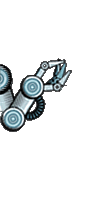|
|
order |
Numbers are put in order of size.
*
|
|
|
ascending |
Ascending order is from the smallest number up to the biggest.
*
|
|
|
descending |
Descending order is from the biggest number down to the smallest.
*
|
|
|
compare |
We compare the size of numbers, for instance which is biggest or smallest or are they the same.
*
|
|
|
digit |
21 is a two digit number.
*
|
|
|
approximate |
An approximate value is close to the original number but not exact.
*
|
|
|
estimate |
We estimate an answer when we use approximate numbers instead of the actual values.
*
|
|
|
decimal |
A decimal number is a number with a decimal point in it, like 1.5.
*
|
|
|
greater |
Greater than means bigger.
*
|
|
|
less |
Less than means smaller.
*
|
|
|
equal |
Equal means things have exactly the same value.
*
|
|
|
round |
We round numbers to make them simpler using approximate values.
*
|
|
|
significant |
Significant figures are a way of rounding numbers starting from the first non zero digit.
*
|
|
|
bound |
The upper and lower bound are the range of values a number can fall between, also called limits.
*
|
* This sentence was added by a Spellzone user.
Test and improve your spelling through focused repetition and drills.



How to use:
Look and read the word.
Say the word. Click the speaker icon.
Cover the word.
Write the word.
Check your spelling.
Reinforce your learning through exciting word games.
 Spelling Snowball
Spelling Snowball
Winter spelling fun!
![]()
![]()
 Egg Hunt
Egg Hunt
Crack the eggs!
![]()
 Word Search, small
Word Search, small
The classic English word game.
![]()
![]()
![]()
 Against the Clock
Against the Clock
Spelling 'against the clock'.
![]()
![]()
 Mayan Temple
Mayan Temple
Try the temple spelling puzzle.
![]()
 Monkey Business
Monkey Business
It's bananas!
![]()
See how well you know these words with a spelling test.
Download and print spelling worksheets for this word list.
Enhance both spelling and handwriting with this activity.

"Thank goodness for Spellzone during this remote learning phase. The site is easy for students to navigate independently and they're really enjoying the activities and spelling games. You get an awful lot for your money with Spellzone. Really reassuring is the very prompt response with helpdesk queries. I've very rarely needed the helpdesk, but when I have, the issue has been addressed and sorted within a very short time."
Sarah Taggart, Oasis Academy Lord's Hill